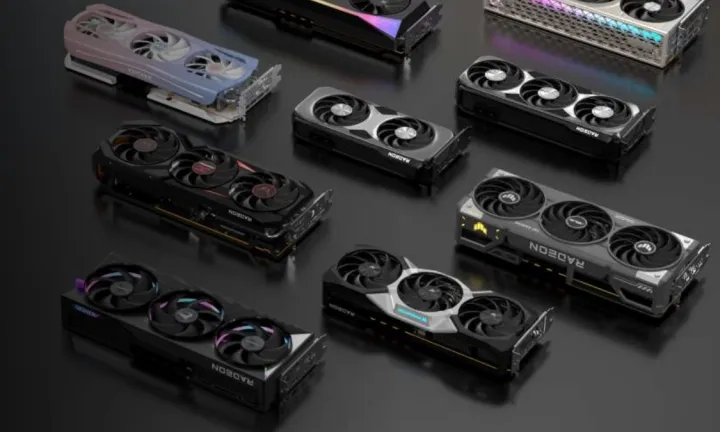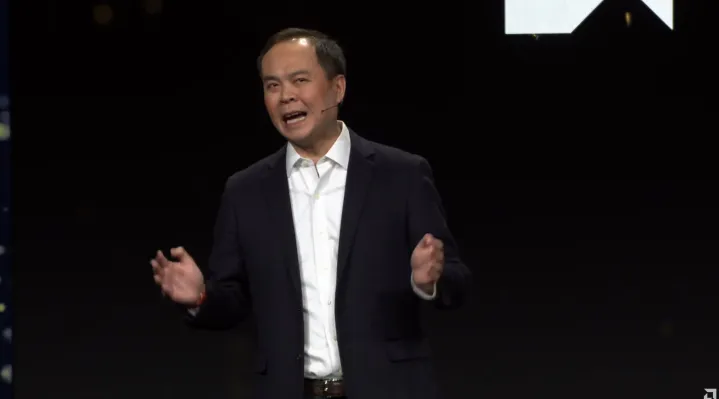
Many awaited AMD’s CES 2025 keynote with bated breath. After all, the company was expected to divulge more information about the RX 9000 series, which could soon compete against some of the best graphics cards.
But, by the end of the keynote, the YouTube chat and my own mind were both flooded with just one question: “What about new graphics cards?”
Nothing but a brief mention

AMD’s 45-minute keynote was packed with announcements. We got a lot of updates on various CPUs, including the new Ryzen 9950X3D, and a slew of laptop processors and APUs. However, the graphics segment didn’t receive any love from AMD, even though that was clearly what many viewers were hoping for.
Jack Huynh, the senior vice president and general manager of AMD’s Computing and Graphics Group, teased the RDNA 4 architecture and machine-learning-based upscaling with FSR 4. This is when I thought we’d hear some exciting RX 9070 XT news, but instead, we got a video from Matt Booty, the president of Game Content and Studios at Microsoft.
Although he teased that technologies like FSR 4 make games like Starfield run better, there was nothing concrete to back up these statements. FSR 4 is still a mystery, as is RDNA 4.
“We absolutely love the gaming community, and we look forward to telling you more about RDNA 4 and FSR 4 later this quarter,” Huynh said. “Now, let’s shift gears to AI PCs.” And that they did, as the rest of the presentation focused largely on non-gaming experiences, including workstations and enterprise-AI-focused CPUs and APUs.
A promise of learning more later this quarter was the last thing I expected. Possible specs for RX 9000 series GPUs have been floating around the internet for weeks now, and yet, there was next to no mention of these cards during CES 2025.
Mind you, the weirdest part is that AMD did share some information about its upcoming GPUs with the media, but it was admittedly pretty scarce. This is another reason why I’m surprised. I went into the keynote thinking we’d get to learn more during the presentation, but we actually got much less than I ever expected, as those RDNA 4-related slides never made it in.
I expected more, not less

What do we know? We know that the new GPUs will be dubbed the RX 9070 and the RX 9060 (as well as their XT counterparts), which we’ve already expected based on previous leaks. AMD shared a slide explaining this change in its naming scheme, saying that it wanted to “simplify it.”
AMD teased the RDNA 4 architecture, pointing to various hardware- and software-level improvements, including better ray tracing capabilities thanks to third-gen RT accelerators. The slides also revealed that we may not get Made By AMD RX 9000 cards, and that all the GPUs will instead be made by AMD’s partners, including Acer, Asus, XFX, Gigabyte, and more.
FSR 4 got its own slide, and arguably, it got more screen time during the presentation than RDNA 4 itself did. It feels like AMD is taking a page out of Nvidia’s playbook here, as Nvidia’s DLSS 3 is an RTX 40-series exclusive, whereas FSR 3 used to be widely available. That will no longer be the case with FSR 4, which will only be available in RDNA 4 GPUs.
In addition, AMD gave us some insight as to the kind of performance we can expect from the new RDNA 4 GPUs. The RX 9070 cards are listed as competitors to the RTX 4070 Ti and the RTX 4070 Super. On AMD’s side, the top GPU is set to keep up with the RX 7900 XT; last-gen’s flagship RX 7900 XTX will remain undefeated. Meanwhile, the RX 9060 will match up against the RTX 4060 Ti and the RX 7700 XT at the most.
This performance bracket is useful, but it doesn’t tell us anything in the way of actual GPU specifications. Leakers have long said that the new AMD flagship will be based on the Navi 48 GPU, and recent rumors claim that it’ll come with 4,096 cores, 16GB of GDDR7 VRAM across a 256-bit bus, and memory speeds of 18Gbps. Clock speeds are said to be high in this generation, with some tipsters saying we can expect up to 3.1GHz.
That’s all well and good, but the problem with all of those spec-related statements is that they’re rumors. They may be true, they may be false — we just don’t know. That’s a strange place to be in, given that AMD just held a 45-minute presentation during the year’s biggest computing event.
Into the unknown

Personally, I was really excited about the prospect of AMD’s RX 9070 XT. I still am, but it’s hard not to feel surprised at the way AMD glossed over all the details of one of its most-anticipated gaming products set to come out this year.
Sure, we now know that the RX 9070 XT will be an upper-midrange card targeting the mainstream market — but we already knew as much, and today brought us very little in the way of new information. The biggest revelation was the fact that FSR 4 will be an RDNA 4 exclusive; everything else was already speculated about for weeks.
We still have a lot of unknowns, including some of the most basic information, such as specs, prices, and release dates for these new cards. All we know is that we’ll learn more during this quarter, but that could mean in two weeks or in two months.
In 2024, AMD CEO Lisa Su teased RDNA 4 while divulging that the company’s gaming revenue declined by 69% year-over-year. Despite a tumultuous year for AMD’s gaming business, Su also promised that RDNA 4 will launch in early 2025, which is reassuring. But it does make me wonder what AMD is waiting for.
Meanwhile, Nvidia is just hours away from announcing its next-gen RTX 50-series. It’s hard to say how much Team Green will be ready to reveal, but at this point, Nvidia won’t need to do much to beat AMD at CES 2025. All Nvidia has to do is say which graphics cards are coming and give a rough overview of each. That’ll still be more than we got from AMD — and it’s hard not to feel a little disappointed.





